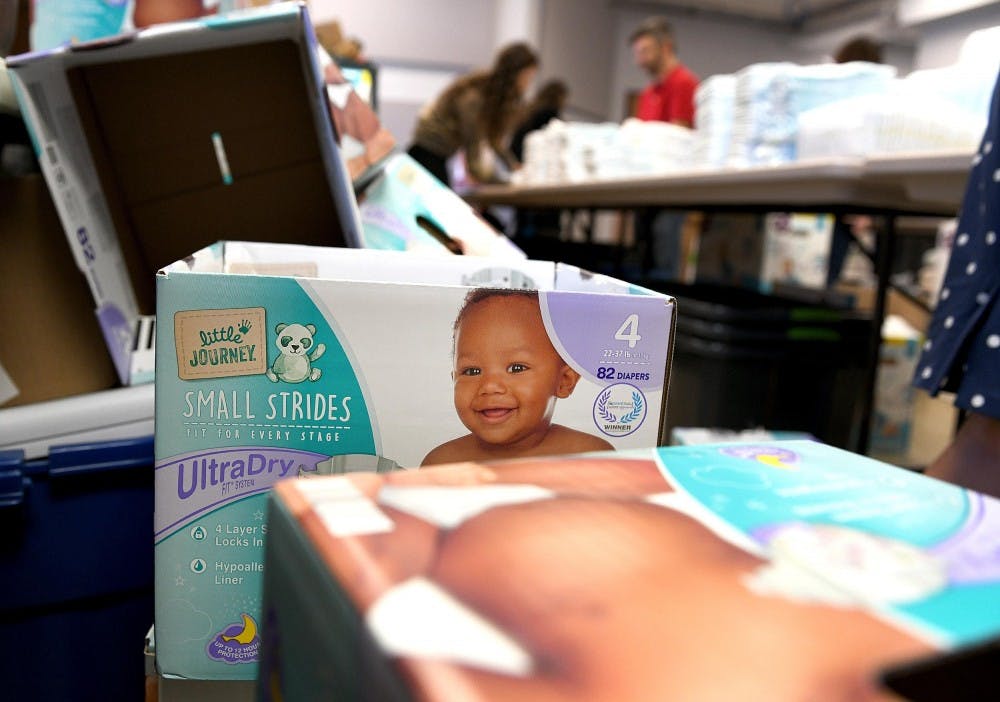Pregnant women are warned about hormonal fluctuations, postpartum depression and a lack of sleep, but the high cost of necessary items isn’t always included in those discussions.
Families with infants across Indiana are struggling to meet the high cost of diapers for their children, which are taxed as a luxury item.
“In the studies that have been done, it’s an issue across all income levels, but the poorest ones are the most impacted group,” said Rachael Suskovich, the founder and executive director of Indiana Diaper Bank, a non-profit charity in Indianapolis that provides diapers for families.
In a blog post she wrote for the Indiana Institute for Working Families, Suskovich said almost half of food bank clients reported they delayed changing their child’s diaper to make their supply last longer, which could lead to irritation and infection.
This issue is prevalent in Bloomington. Suskovich said around one-third of families with young children are struggling to cover the cost.
But the issue has been gaining traction with public policy.
“A lot on representatives, both local and national are making strides toward change to help families,” Suskovich said. “We have done a good job of helping food insecurity and establishing food banks, and now it’s time to focus on other necessary items.”
Suskovich said only 15 out of 50 states are putting funding toward helping solve diaper need and have abolished the taxes on diapers, deeming it a necessary good.
“Diapers are taxed as a luxury item, so that is why the poorest of the poor are the most affected,” Suskovich said. “The tax revenue is millions and billions dollars of taxes every year.”
She said many states don’t want to give up that revenue and are wary of abolishing the tax. Other states who have gotten rid of it have increased taxes for liquor and non-necessity items to make up for it.
“Even though we are not one of the 15 out of 50 states, Indiana has been one that has legislation going up for a hearing every year, but unfortunately it has gotten denied every year,” Suskovich said. “When it comes to public policy, our leaders are active on this issue.”
Communities in Indiana are taking action as well, such as All-Options Pregnancy Resource Center. The center has the Hoosier Diaper program, which provides disposable and cloth diapers to women in the community.
Located in Bloomington, the center serves the city and Monroe County. The diaper program has been operating since May 2015 and has had a very high demand.
“When we started we were absolutely flooded,” said Jess McCanse, the center manager at All-Options. “As many as we are helping, we still have about 100 families on our waiting list.”
They try to make getting help very straightforward for the families.
“We try to keep the barriers as low as possible," McCanse said. "If they’re on WIC, we don’t require them to provide proof of that. We’re not coming from a place of judgement – if they’ve walked through the door that’s a proof of their need.”
The center purchases most of its diapers with grants and donation funds, but it also receives diapers from community donations as well. There are many options to get involved, such as sponsoring a family in need for a month.
“When we spent money on diapers it would make us stretch where we had to cut another cost,” said Jessica Shipley, a client of the Hoosier Diaper Program who is currently supporting three children. “Since I’ve had help, I've been able to get them more clothes and shoes.”
Samantha Starks, another client, stressed the cost both with and without the program.
“We still spend a good $75-150 a month on diapers, even with the program,” Starks said. “Without it it’s at least $200 a month, and that’s only because one of the kids has allergies.”
Starks said if the children need a specific brand for their allergies, All-Options accommodates their requests.
“Diapers are just expensive, and I just appreciate everything they’ve done for us,” Starks said. “They want to see people succeed.”
According to Suskovich and McCanse, the best way for the community to help is to spread awareness and donate to local centers.
“Because it is an overlooked need, we need to create that awareness,” Suskovich said. “That will be so important to make a change.”




